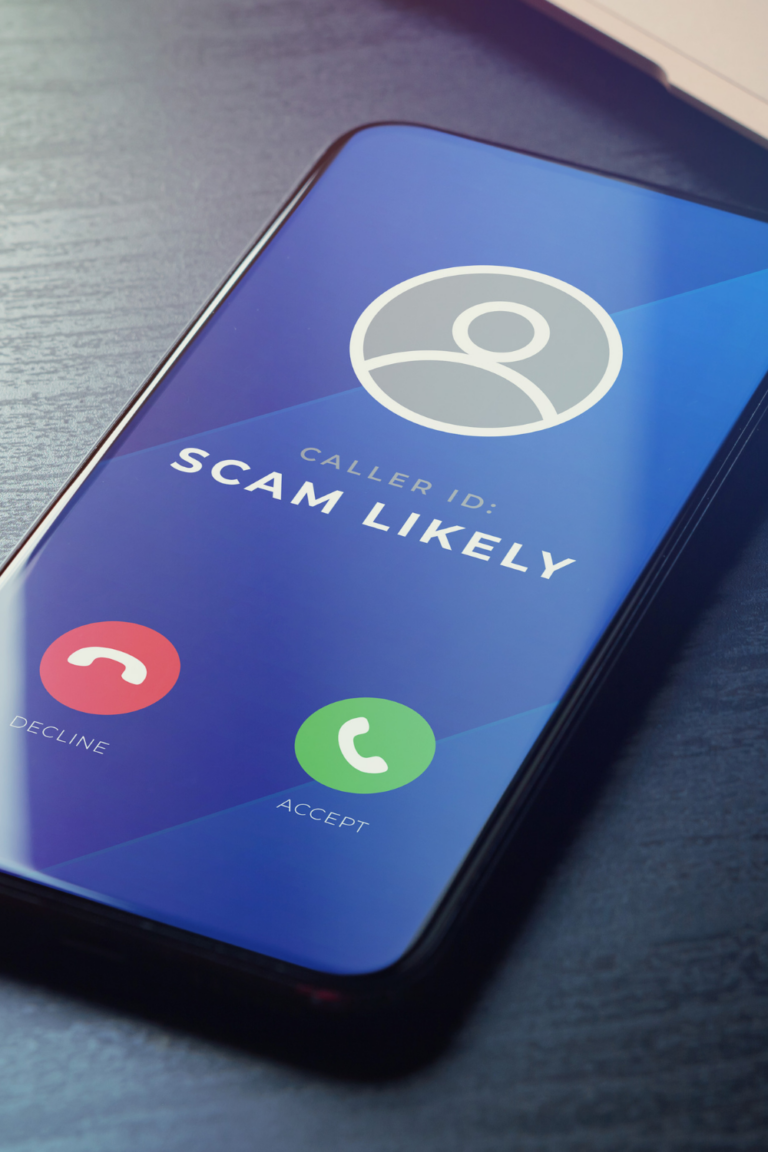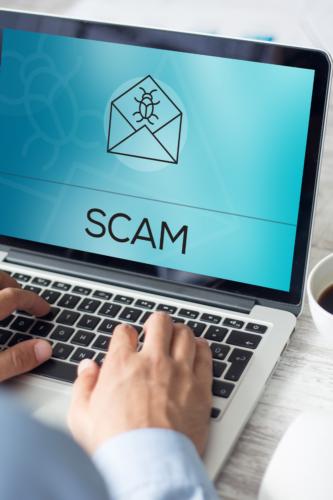This week is National Consumer Protection Week and is the perfect time to share some valuable information from Clackamas County Bank (which you can find in our Consumer Protection workbook.)
Clackamas County Bank is dedicated to protecting their local customers, and Birch Community Services is grateful for the helpful information they’ve shared about how to avoid financial scams and fraud. There are more scams out there than we can cover but we are going to hit on the most common in hopes that they can help you detect any that come your way.
Now let’s talk about the Top 15 Scams to Avoid:
- Gift Card Scam
- Money Mule Scam
- Tech Support Scam
- Ransomware
- Phishing
- Work From Home Scam
- Multi-Level Marketing (MLM) Scam
- Online Shopping Scam
- Government Grant Scam
- Student Loan Forgiveness Scam
- Tax Scam
- Cryptocurrency Scam
- Rental Scam
- Romance Scam
- Fake Debt Collectors

What is a Gift Card Scam?
If anyone demands that you pay them with gift cards, they are scammers. They will typically tell you which stores to get the gift cards from. They may claim to be a government agency, a utility company, a tech support company, or even someone you met on a dating site.
Anyone claiming you need to send them a gift card for any reason is running a scam.
What is a Money Mule Scam?
Scammers send money to you, sometimes by check, then ask you to send most of it on to someone else. They say you get to keep the difference as a fee or commission.They often want you to use gift cards or wire transfers. But you would soon discover that the original money was either stolen or the check is fake.
This scam can present itself in various guises:
Car wrap scam—someone offers to pay you to have your car wrapped in an advertisement for a popular company and then drive as you normally would.
Overpaying for purchase scam—someone overpays you via PayPal or another online payment method or a large-ticket item you’re selling, often by adding a zero to the end of the amount (for example, $5000 instead of $500). Then they ask you to correct the “mistake” by sending back the extra money. They push you to hurry with the refund so that it happens before you realize their money was never real.
What is a Tech Support Scam?
Someone contacts you out of the blue and scares you into believing your computer is compromised, and then offers to “fix” the problem for a fee.
This can look like:
A pop-up warning on your computer that appears to be from Microsoft or Apple.
A spoof caller IDs and use logos that look legitimate in emails.
They may request remote access to your computer.
They may ask for bogus service contracts.
Remember, if you didn’t initiate the service, then it’s most likely a scam.
What is Ransomware?
Ransomware is malware (vicious software) that gets hold of the data on your computer or network and locks it. The perpetrators who initiated the malware will then demand a ransom in order to give you the key to unlock your data. This type of extortion is usually targeted at companies and businesses that have the means to pay a ransom. Ransomware can be deployed on your computer system through phishing emails.
As an individual and as an employee, you need to be very careful about clicking on links or opening attachments in emails and texts.
What is Phishing?
Phishing emails and text messages may look like they’re from a bank, a credit card company, a social networking site, an online payment website or app, or an online store. They may tell you a story to trick you into clicking on a link or opening an attachment.
They may claim:
They noticed suspicious activity or log-in attempts
There’s a problem with your account or your payment information
You need to confirm personal information
They may include:
A fake invoice
A link to make a past-due payment
Information on how you are eligible to register for government benefits
Offer refunds or coupons, etc.
But once you’ve clicked the link or opened the attachment, you’ve unleashed the malware on your computer and potentially on your network.
How to protect yourself from phishing attacks:
Protect your computer by using security software and set it to update automatically so it can deal with any new threats.
Protect your mobile phone by setting software to update automatically. These updates could give you critical protection against security threats.
Protect your online accounts by using multi-factor authentication: password PLUS fingerprint, or having a one-time-use code sent to your email which you then type in.
Do not click on links you receive in emails or texts before you look at the sender’s information and verify it is legitimate.

What Is a Work-from-Home Scam?
If that new job offer sounds too good to be true, IT IS!
What the advertised job might look like:
- Stuffing envelopes (“you never have to leave the house!”)
- Selling products or services to friends or family
- Reshipping products or reselling luxury goods (which are stolen)
- Real estate investing/flipping houses
- Business coaching programs
- Training programs (“learn how to do XYZ and earn $1M dollars in just 3 days!”)
You will never have to pay to get a legitimate job. Before you agree to anything, search the company name plus the word “scam,” “review,” or “complaint.” You may find that the company has already scammed other people.
What is a Multi-Level Marketing Scam (MLM)?
Businesses that involve selling products to family and friends and recruiting other people to do the same employ a strategy called multi-level marketing (MLM). Some MLMs are pyramid schemes.
Legitimate MLM Practices:
- If the MLM pays you based on your retail sales, without having to recruit new distributors, it’s legitimate.
- You are getting paid for the work you put in.
MLM Scam Warning Signs/Practices:
- They incentivize you to recruit new distributors and product sales are secondary.
- They require that you buy product and/or carry a certain level of inventory.
- They make extravagant promises about your earning potential, then emphasizes recruiting new distributors as the way to make real money.
- If the business is costing you more than you earn (required inventory).
You will recognize the names of some MLM companies that are pyramid schemes. They usually have powerful marketing messages.
Remember if no matter how hard you work, you can’t really earn much, then it’s not worth your time.
What is an Online Shopping Scam?
It is very easy to create fake websites that look like the real thing. They steal logos to make their products seem legitimate. But you’ll either receive a knockoff product for your payment, or you won’t receive the product at all.
Be especially wary if:
- The website ordering process requires that you pay with a money order, pre-loaded money card or wire transfer. None of these methods of payment are refundable.
- The offer pops up on social media. Their online stores may pop up and disappear, then pop up again, usually offering deals that are too good to be true.
Be careful of who you do business with online, just as you would in person.
What is a Government Grant Scam?
Scammers may contact you in several ways (phone call, email, text), offering free money from the government. This is ALWAYS a scam.
They’ll make big promises about free money you can use for:
- Education
- Home repairs
- Home business expenses
- Household bills
- Other needs
This scam has several steps:
- They may say they’re with a real government agency (like the Social Security Administration) or they’ll make up a name of an agency that sounds as though it could be legitimate (like the Federal Grants Administration).
- If you listen or respond, they’ll typically ask you personal questions to see if you “qualify” for the assistance (you will).
- Then they may ask for your bank account information so they can “deposit” your grant money. Or they may want you to pay a fee in order to “claim” your grant.
- They may even promise a refund of your fee if you aren’t happy with the results. You’ll never see any of that money again.
- Next they may drain your bank account.
The government will never contact you about a grant, so never share your personal or financial information with someone who initiates the contact with you. And don’t pay for a list of government grants.
What is a Student Loan Forgiveness Scam?
A company promises to help you pay down your loan faster or get it forgiven quickly.
What you need to know about student loan forgiveness services:
- It’s illegal for a company to charge you in advance for helping you reduce or get rid of your student loans. If you pay upfront, you won’t see that money again, and you won’t get help.
- No loan forgiveness happens quickly.
- A Department of Education seal doesn’t mean it’s legitimate. Logos are easy to copy, and no one has special access to federal programs.
- Don’t share your Federal Student Aid (FSA) ID with anyone. Once someone has your ID, they can take control of your personal financial information on the U.S. Department of Education websites.
There’s nothing a company can do for you that you can’t do for yourself for free.
- If you have federal loans, start with studentaid.gov/repay.
- If you have federal loans and work in public service, start with studentaid.gov/pslf/
- If you have private loans, contact your loan servicer.

What is a Tax Scam?
Criminals pose as IRS agents, making aggressive calls in the hopes of stealing taxpayer money or personal information.
The IRS will never:
- Call to demand immediate payment using a specific payment method.
- Leave prerecorded threatening voice mail messages.
- Threaten to immediately bring in local police or other law enforcement groups to have you arrested for not paying.
- Threaten to have you deported.
- Threaten to have your business license revoked.
- Threaten to remove you from government assistance programs.
- Demand that taxes be paid without giving you the opportunity to question or appeal the amount owed.
- Call unexpectedly about a tax refund.
- Initiate contact with you via email. If you receive an email from an agency that looks like the IRS or something related to the IRS, you can forward that email as an attachment to phishing@irs.gov to report it.
What is a Cryptocurrency Scam?
Any organization that offers to pay you in cryptocurrency or expects you to pay in cryptocurrency in order to join, participate, or buy in is a scam.
If you truly want to add a cryptocurrency to your investment portfolio, you don’t need someone else’s help. It’s easy to do yourself—and safer. But like with all speculative investments, don’t put in more money than you can afford to lose.
Signs of a scam:
- They guarantee you’ll make a profit.
- They guarantee you’ll make a lot of profit. Don’t let greed blind you.
- They promise free money. It’s never free.
- They’re unwilling to explain how their investment works or claim they have a special or proprietary process for growing wealth.
- Most celebrities are not financial gurus. Just because a celebrity says so, doesn’t make it true. And celebrity endorsements can be easily faked.
What is a Rental Scam?
Scammers post fake listings and try to get you to place a deposit on a housing unit that doesn’t exist, or on a real housing unit that doesn’t belong to them and which they don’t have permission to rent out.
How to identify a possible rental scam:
- The advertised price is much lower than that of similar properties.
- Ads for the property have grammatical and spelling errors or overuse capital letters.
- The ad uses uncommon spellings of words, such as “favour” instead of “favor.”
- You can work only with an agent. The agent says that the owner is too busy, out of the country, or otherwise unavailable to handle the rental.
- The owner or agent requires you to sign the lease before you see the rental property.
- The owner or agent isn’t able to let you enter the house or apartment or charges you a fee to view it.
- The owner or agent uses high-pressure sales tactics. They may urge you to rent quickly before someone else gets the property.
When you’re considering renting a property, DO these things:
- Search online for the owner, real estate management company and listing. If you find the same ad listed under a different name, that’s a clue that it’s a scam.
- Visit real estate websites. See if the property you want to rent is also listed in another city. A scammer could have copied another, legitimate ad from somewhere else and posted it in your area.
- Get the terms of your rental in writing, including fees, rent and maintenance. Review this document before you sign.
- Get a copy of your lease, signed by both you and the property owner/manager if you do enter a lease.
When you’re considering renting a property, DON’T do these things:
- Wire money as a deposit or fee. Wiring money is the same as handing over cash—you can’t get a refund, even if you find out the offer was a fraud.
- Give in to high-pressure sales tactics.
- Rent a property you are unable to see in person (if you’re moving to a new area, you may ask a friend or relative to review the property in person for you).
- Pay fees or deposits until you have reviewed and signed the lease/rental agreement.
- Give your personal information or Social Security number to a property owner without verifying their identity.
- Visit a potential rental property alone. Always go in pairs!
What is a Romance Scam?
That handsome guy or beautiful woman you met on a dating app or via social media might not be who they say they are. Especially if they ask you for money or another form of financial assistance.
Stories they might tell you:
- They need to buy a plane ticket.
- They need to pay for urgent medical care.
- They need to claim something from customs by paying a fee.
- They need travel documents or a visa.
How to avoid a romance scam:
- Never send money to someone you haven’t met in person.
- Don’t pay for them to come see you (they won’t show up).
- Immediately block or unfriend anyone who asks for money via social media.
- Share your concerns with friends or family. It helps to get a second opinion…
Who are Fake Debt Collectors?
Scam artists pose as debt collectors and contact you trying to collect on a loan that was never made or a loan that has already been repaid.
Signs that the debt collector is fake:
- They are seeking payment on a loan you don’t recognize.
- They refuse to give you a mailing address or phone number.
- They ask you for personal financial or sensitive information.
- They exert high pressure to try to scare you into paying right away, such as threatening to have you arrested or report you to a law enforcement agency.
What you should do if you think the caller is a fake debt collector:
- Ask for their name, company, street address and telephone number.
- Tell them you need documented proof of the outstanding debt. Debt collectors are required by law to first give you written information about the debt before attempting collection. They should have your information on file—don’t give them any information.
- Stop speaking with the caller.
- Contact your creditor directly.
- Report the call to the Federal Trade Commission https://reportfraud.ftc.gov/

Key Hallmarks of Most Scams
There are more scams out there than we could possibly cover. Be aware that scammers read the news too, and their approaches will match what’s currently trending.
Here are the key hallmarks of a scam:
- They approach you.
- They pressure you to make a decision quickly or even on the spot, they promote a sense of false urgency or panic.
- They offer a deal that’s too good to be true.
- Their threats aren’t realistic (you’ll go to jail, you’ll be deported, your credit has been hacked and there’s rampant fraud on your accounts, you’ll lose some sort of valuable prize you never applied for).
- They can spoof phone numbers, email addresses and websites, so they can seem legitimate.
Here are the best defenses:
- “I need to think about this.”
- “I’ll discuss this with my spouse/friend first.”
- “I never buy from strangers.”
- “I don’t do business with people I don’t know.”
- Hang up. Block the phone number. Don’t believe caller ID.
- Always hang up on robocalls. Don’t press 1 to speak to a person or to be taken off the list…that will lead to more calls. And these types of calls are already illegal.
- Don’t click on that link!
- If you’re worried, you can verify their claims independently…do your own due diligence, but always make sure to talk with someone else for that valuable second opinion!
- Do an internet search by typing in the name of the company or person and the words “review,” “scam,” or “complaint” to see what others are saying.
- Be skeptical of free trial offers…research the company and read the cancellation policy.
- Always review your monthly statements for charges you don’t recognize.
What Is Identity Theft?
Identity theft is different from a scam in that the crooks aren’t stealing directly from you. Rather, they are pretending to BE YOU and take out loans or borrow money or conduct business in your name.
Very often, you’ll find out that you’ve been a victim of identity theft when:
- You’re contacted about a loan you didn’t apply for.
- You are notified that you already filed a tax return when you haven’t yet. Someone else filed in your name and claimed a refund.
The preventive measures you can take to help protect yourself from identity theft are the same ones you can take to protect yourself from scams. In addition, you can buy identity theft insurance—which can never prevent identity theft, but will help you clean up the mess if it happens to you.
If a person or business promises to protect you completely from identity theft, they are lying. Complete prevention isn’t possible—you’ll still need to remain vigilant.

What to Do If You’ve Been Scammed?
- Stop the Money Flow: No matter how you paid—debit or credit card, bank or wire transfer, gift card, or cash reload card—immediately contact the company you used to send the money, report the fraud, and ask to have the transaction reversed, if possible. Report job scams to the Federal Trade Commission.
- Talk About It: Remember that scammers are very creative and very skilled. If you’ve been taken advantage of (or had a close call), the best thing you can do is talk about it—tell your friends and family—because your warning might be the thing that helps keep them from falling for the next tale a scammer tells.
- Share Your Knowledge: This builds our collective wisdom. You can report identity theft at https://www.identitytheft.gov as well as to the local police.
Some Preventive Measures To Leave You With:
- You can sign up for free scam alerts from the Federal Trade Commission at https://consumer.ftc.gov/scams
- You can sign up for the Do Not Call list at www.donotcall.gov
- Create strong passwords for all your online accounts and never use the same password for more than one account. To make this easier, use a password management software/plugin for your browser.
- Use two-factor or multi-factor authentication for your online financial accounts. You’ll get a one-time code via text or email that double-checks you are who you say you are (and makes it harder for crooks to access your info).
- Bookmark all the financial websites you use in your browser. Don’t search for them when you need them because sometimes the search results offer phony options that look very similar to the real site.
- Make sure any financial apps you use are the legitimate ones connected with the right institutions. Beware of phony apps that look a lot like the real deal.
- Make sure to do online banking only over secure wi-fi, like your private home network. Checking your accounts while working on your laptop at a coffee shop is not a great idea.
- Don’t use peer-to-peer (P2P) payment apps with people you don’t know. If you send money using one of these apps, it’s gone for good—no refunds.
- You can put a credit freeze on your accounts with each of the credit bureaus: TransUnion, Equifax, Experian.
- If you get a fishy phone call claiming to be from a bank or business you work with, hang up immediately. If you choose to call back, you initiate the call to the phone number you have in your records, or check the customer service phone number printed on your statement or on the back of your credit/debt card. Don’t ask Alexa or a smart speaker to connect you, and don’t hit redial because you’ll just be calling back the fake representative who has spoofed the bank or business’s phone number.
- Never, never reply to an email asking for personal or financial information.
- Never, never reply to a text asking for personal or financial information. Don’t call the phone number listed, and don’t click on any links in the text.
- Review ALL of your financial statements EVERY SINGLE MONTH. The faster you catch fraud, the less of a headache you’ll have.
